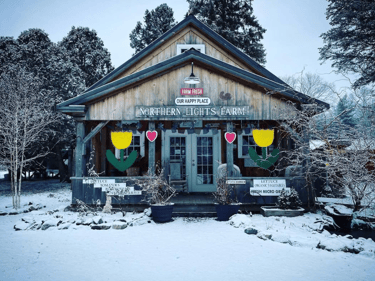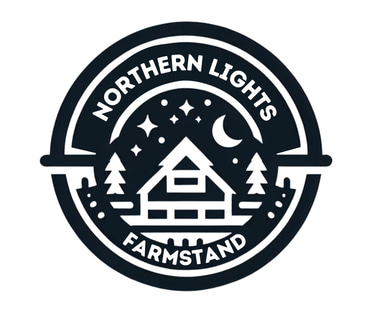
Our History in Ipswich Village
History of the Farm
Northern Lights Farm, at the corner of High Street and Paradise Road in Ipswich, is situated in an area with a long and interesting history. The land was originally the site of the first ever apple orchard in the town. As Thomas Franklin Waters wrote, "the six acre lot on the south corner of Paradise road was in-herited by Susanna, wife of Benjamin Kimball, Jr., and daughter of John Potter in 1802. Mr. Rutherford, owning the land in the mid 19th century, conveyed 4 acres to his son, Augustus H. Rutherford, and to the widow, Mary J. Rutherford, who eventually sold it to Luther Nourse, in 1890, and he to his daughter, the widow Caroline E. Pickard, on October 16, 1896."
Today, the farm can trace its roots back to the Pickard/Nourse family.
History of Ipswich Village - Upper High St.
The community on Upper High Street known as Ipswich Village developed as an enclave of its own, looking primarily to Rowley for religious and social affiliations. Farming was the primary occupation of residents until the 20th century, but shoemaking became prevalent in the 19th century.
There were at one time eleven shoemaker shops in the village.
The following narrative includes excerpts from "Ipswich Village and the Old Rowley Road" by Thomas
Franklin Waters in 1915:
"At the very beginning of the Town, High Street was the road to Newbury or 'the pathway leading toward the River of Merrimac.' No section of our Town has more substantial and picturesque interest than this quiet neighborhood. Its close connection, geographically and socially, with
Rowley, separated it from Ipswich to such a degree that the Ipswich Town Clerk of the olden time made very incomplete entries of the births, marriages and deaths, which have been preserved fortunately in the Rowley church records. Though the name, "The Village" or "Ipswich Village," as applied to this neighborhood, is of comparatively modern origin, the settlement itself dates from the beginning of the Town. At a very early period houses were built, and Jewett's grist mill, on Egypt River, before the 17th century was ended. The annals of this little community are of singular interest."
Pingrey's Plain - Gallow's Lot
Long before the corner of Mile Lane and High Street in Ipswich became famous for the Clam Box (and
Northern Lights Farm), it was known as Pingrey's Plain and it served as the olde Ipswich hanging grounds.
On August 6th, 1795, Pomp, an enslaved African-American was hanged for chopping off the head of his master, Captain Charles Furbush while he slept beside his wife.
Thomas Franklin Waters wrote that
"A great multitude, filled with morbid curiosity crowded into the meeting-house when Pomp, the negro murderer, was brought there in his chains on the day of execution to hear Mr. Frisbie preach his funeral sermon, after which he was taken to his hanging."
During the witch craze of the 1690s, accused women were hanged here as well. Rebecca Nurse (Nourse), ancestor of the eventual owners of the farm, was also accused of witchcraft and hanged at Proctor's Ledge in Salem on July 19, 1692.
Roads to Paradise
Laid out by the town in 1807, Paradise Road follows a shallow peninsula bordered by Muddy Brook and the Egypt River.
Thomas Franklin Waters wrote: "The early farm of Mr. Charles Day was on the ancient way, now called not inaptly Paradise Road, for it is a very
beautiful road, winding through long stretches of woodland, where ferns and brakes grow luxuriantly, and every kind of wild flower finds congenial haunt in open glades or shaded nooks."
At the far end of Paradise Road, several acres have been bulldozed and flattened as part of the Mill River Sand and Gravel operation, which began operations in the early 1950's.
At the site, a group of young amateur archaeologists known as the "Bull Brook Boys" discovered hundreds of stone points and other early Native American artifacts. The "Bull Brook Site" dates back 11,000 years and is one of the earliest Paleolndian finds in North America.
All historical information courtesy of Ipswich Historical Society


This is my happy place, they have the most wonderful setting & decorate for every holiday. Along with their own & other farmers, their produce, jams, honey, pies & much more. They also have acres of gorgeous flowers. What I also like is that the owners RESCUE many animals. I discovered NL one day years ago and it is my favorite happy place. It feels MAGICAL here!
Margaret Dezenzo
Such a great place. Fresh produce, baked goods, Amish furniture, homemade crafts and the best part animals! Make sure to visit with Francesca the pot bellied pig, a rescue, who is so sweet and loves to be petted. Donkeys, geese, chickens and other animals are friendly & on site.
Wendy Sullivan
★★★★★
★★★★★
Local Guide - Via Google
Local Guide - Via Google
Contact
© 2025. All rights reserved.
Stay in the Loop
Winter Hours
Daily: 11am - 5pm
Closed Sundays
Open Year Round
Web Design by Danzinger Design
